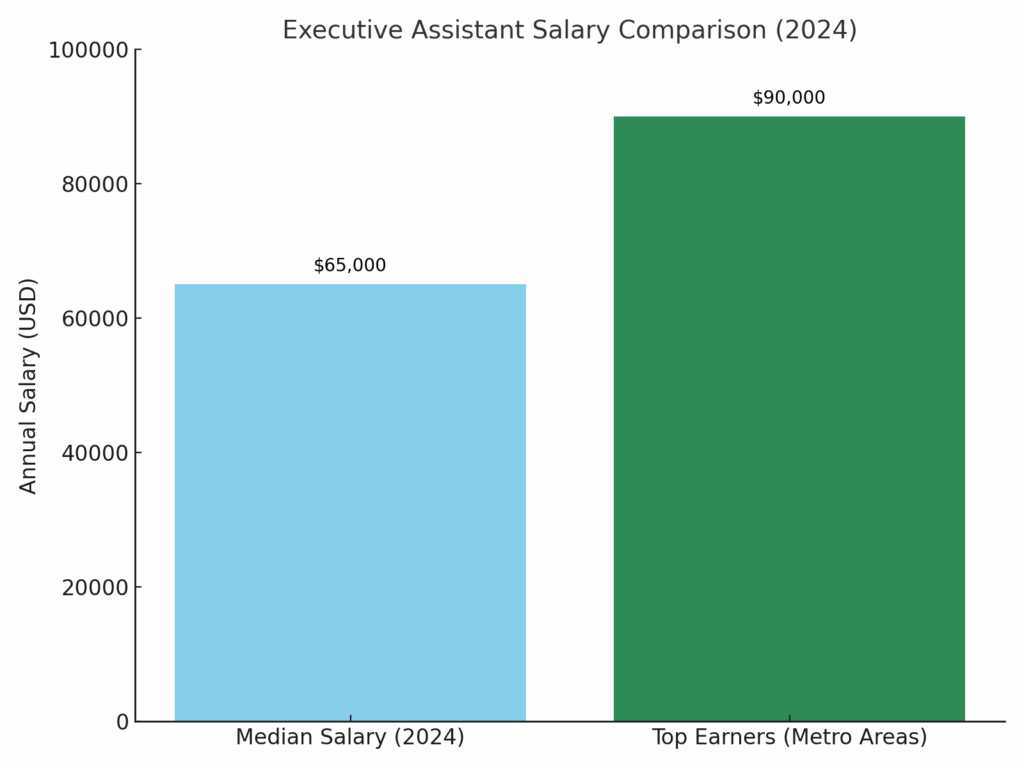
“An executive assistant (EA) is a high‑level administrative professional who, like an office manager, partners directly with C‑suite leaders or any executive member to perform strategic duties” making the executive assistant position one of strategic importance board members, or senior executives to manage time, information, and workflows, leveraging exceptional interpersonal skills. Unlike traditional administrative assistants, the executive assistant operates with greater autonomy, strategic insight, and a mandate to solve complex problems for the business leader. The executive assistant job description often EAs boost organizational efficiency by managing executive assistant duties that free executives to focus on strategy and decision‑making includes a blend of administrative coordination, strategic partnership, and proactive communication management. In today’s remote-first world, many professionals are choosing to pursue a virtual executive assistant job that supports work life balance while delivering high-level results that allows them to support leaders from anywhere, providing the same high-level support from anywhere in the world.

An executive assistant boosts organizational efficiency by handling multiple task duties responsibilities and freeing executives to focus on strategy and decision‑making. “From orchestrating global travel to managing confidential data, an administrative assistant or executive assistant’s proactive support creates various responsibilities create more efficient office environment and can multiply top‑level productivity by up to 40%.”

What: “Use your organizational skills to strategically organize and prioritize your executive’s appointments within the organization—essential responsibilities for maintaining productivity reminders, and inbox through effective calendar management.”
How: Leverage executive‑level smart scheduling tools (e.g., Calendly, Microsoft Bookings) and implement a priority‑tag system.
What: “As an executive assistant,“…planning, setting up, and following up on meetings—both in‑person and virtual—across the organization with key executives and directors are considered foundational executive assistant duties…” that demand comprehensive knowledge of stakeholders and objectives.”
How: As an executive assistant, prepare agendas, manage RSVPs, send pre‑reads, take minutes, and track action items in a shared task board.
What: “Arrange business travel, accommodation, and ground transport—becoming the person who ensures seamless executive mobility for the organization.” using administrative tasks excellent organizational skills travel arrangement expertise is essential, especially in a fast paced environment where timing is critical.
How: The executive assistant should use corporate booking platforms with policy‑driven approvals to streamline travel arrangement processes.
What: “Draft, edit, and format executive reports, proposals, and slide decks that inform both leadership and employees about strategic initiatives.”—based on key meeting notes and decisions. Duties that are often shared with an administrative or executive assistant.
How: The executive assistant should “Compile expense reports, and other documents reconcile credit‑card statements, and monitor departmental budgets, including office supply spending and inventory ”on SharePoint or Google Drive.
What: “Gather industry insights, competitor data, and background materials, and categorize them using a structured filing system to support informed decisions toward a business goal.
How: An executive assistant can subscribe to paid research tools (e.g., Gartner, Statista) and distill key takeaways into executive summaries.
What: Compile expense reports, reconcile credit‑card statements, and monitor departmental budgets by keeping track of all financial documentation using detail‑oriented executive assistant skills.
How: “Implement executive expense software (e.g., Concur, Expensify) with automated receipt capture, phone calls for follow-ups, and reminder workflows.”
What: “ Filter phone calls, emails, and meeting requests using your ability to responsible, prioritize and protect your top-level executive’s focus.”
How: The executive assistant should develop a clear SLA (service‑level agreement) for urgent vs. non‑urgent requests, and maintain a concierge‑style intake form.
What: Master the software stack—calendar apps, communication platforms, project‑management tools.
How: An executive assistant can earn certifications (e.g., Microsoft Office Specialist, Asana Certified Pro) to streamline workflows and train other staff to the tasks.
What: “The executive assistant should anticipate needs, troubleshoot roadblocks, and propose creative solutions that improve the overall work environment.”
How: The executive assistant should hold a weekly “pre‑mortem” session to identify potential issues and establish contingency plans.
What: An ideal candidate can lead small projects or initiatives to do the task on behalf of executives or the executive team that require exceptional time management skills to meet deadlines.
How: “An executive assistant can use Kanban boards (e.g., Trello, Jira) to map deliverables, demonstrating the ability to set milestones and report progress in weekly dashboards.”
According to the U.S. Bureau of Labor Statistics, executive assistant employment is projected to grow 1% between 2023 and 2033, reflecting steady demand despite automation trends. The median annual wage for EAs in 2024 was $65,000, with top earners exceeding $90,000 in major metros.

Source: Bureau of Labor Statistics
EAs handle strategic tasks and high‑stakes communication, while admin or personal assistant roles often focus on general support needs.
EAs make calendar adjustments and approve minor budget items; these are part of the elevated job requirements that distinguish them from traditional admins.
EAs require advanced project management, research, and problem solving skills to handle the task complexity of the role in addition to core admin functions.

A: Earn an associate’s or bachelor’s degree in business or a related field, then gain 2–3 years of admin support experience. Certifications like CAP (Certified Administrative Professional) prepare candidates for advanced administrative duties and strengthen your executive assistant candidacy.
A: An executive assistant needs strong written/verbal communication, advanced Excel or database skills, time‑management prowess, and professional discretion.
A: Yes. Hybrid and fully remote executive assistant roles are increasingly common, especially when equipped with secure collaboration tools (e.g., VPN, Slack). This flexibility has fueled the rise of the Virtual Executive Assistant as a modern career path.
“By mastering these ten core responsibilities—and layering in strategic skills like research, project management, and meeting facilitation…”, and tech certifications—you’ll not only excel as an executive assistant but also position yourself for leadership roles (e.g., Chief of Staff).Ready to take the next step? Download our toolkit, update your resume, and start charting an executive assistant career that truly makes an impact.
A quiet brilliance unfolds as you step into this blog — like opening a window to a calm, sunlit morning where each idea arrives with purpose and grace. Every article feels like a conversation with a trusted guide, gently helping readers rediscover the art of working smarter, not harder.
Venture further, and you’ll find content tailored to both the seasoned entrepreneur and the rising virtual professional. From legal offices to real estate teams, each post offers insight crafted with experience, care, and a deep understanding of what modern work truly needs.
Marketing Assistant Job Description Marketing Assistant Job Description: The Ultimate Guide A well-crafted marketing assistant job description is the foundation
Bilingual Virtual Receptionist Bilingual Virtual Receptionist: A Smart Move for a Diverse Business Landscape Introduction A bilingual virtual receptionist can
Appointment Setter vs Sales Representative Appointment Setter vs Sales Representative: What’s the Real Difference? In the world of sales, roles
Administrative Virtual Assistant Duties: Their Key Role Administrative Virtual Assistant Duties: The Ultimate Guide In a fast‑paced business landscape, every
Virtual Legal Assistant How Legal Consultation Can Assist in Insurance Claims Dealing with an insurance company can quickly become overwhelming,
What Are Virtual Receptionist Jobs? A Complete Guide In an era of remote work and on‑demand customer service, virtual receptionist
Latino Pro links top Latin American remote talent with U.S. businesses.
Latino Pro links top Latin American remote talent with U.S. businesses.
Latino Pro links top Latin American remote talent with U.S. businesses.
© 2025 SEO’d with ♥ by the experts of SEO Echelon